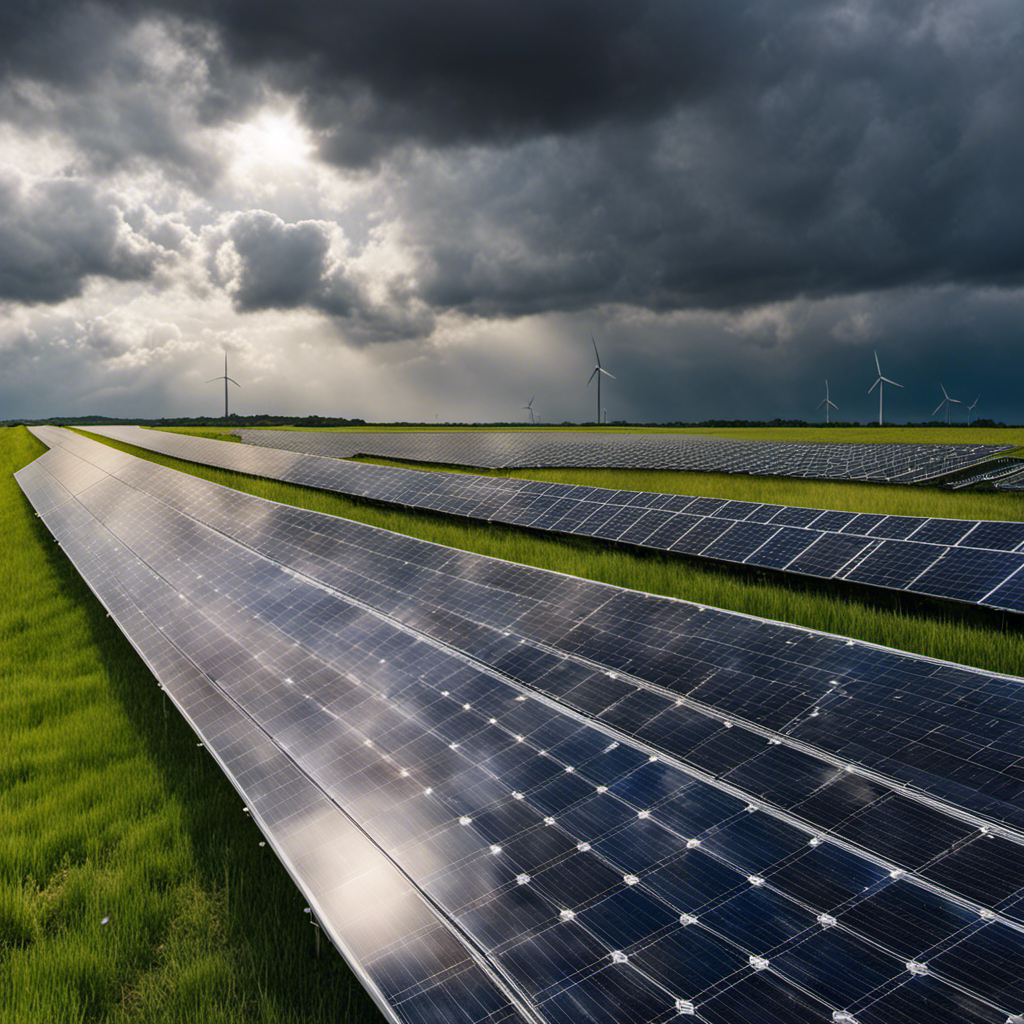Wind Energy
The Affordability and Benefits of Electric Cars

Exploring the realm of electric vehicles, I find myself fascinated by their cost-effectiveness and the vast array of advantages they provide. From reducing expenses to lessening environmental effects, these cars hold the possibility of transforming the way we view transportation.
In this article, we will explore the factors that make electric cars a smart choice for budget-conscious buyers. We’ll compare prices, examine running costs, and delve into financing options and tax incentives.
Join me on this journey as we uncover the true value of electric cars.
Key Takeaways
- Price comparisons and consideration of running costs are important factors in determining the affordability of electric cars.
- Adequate range and battery life are crucial considerations for budget-conscious buyers.
- Researching the availability and accessibility of charging stations is essential for electric car ownership.
- Electric vehicles have lower maintenance costs and potential savings on fuel expenses, offsetting higher insurance costs over time.
Cost Savings: Comparing Electric Car Prices and Running Costs
I find it important to compare the prices and running costs of different electric car models to ensure cost savings.
When it comes to electric car price comparison, it’s crucial to consider not only the initial purchase price but also the long-term running costs. Calculating running costs involves evaluating factors such as electricity rates, charging efficiency, and the vehicle’s energy consumption. By comparing these aspects, you can determine which electric car offers the best value for money.
Additionally, considering the lifespan and fuel savings of electric cars is essential in assessing affordability. It’s also worth researching local grants or tax incentives that can further reduce the overall cost of owning an electric car.
Taking these steps will help you make an informed decision and potentially save money in the long run.
Maximizing Value: Lifespan, Fuel Savings, and Affordability Factors
Considering the lifespan and potential fuel savings are essential factors in maximizing the value of my electric vehicle purchase.
Improving battery technology has significantly increased the longevity of electric car batteries, ensuring they last for many years. This means that even though electric vehicles may have a higher upfront cost, the long-term savings on fuel expenses can outweigh this initial investment.
Additionally, the availability of used electric cars in the market provides an opportunity for budget-conscious buyers to purchase an electric vehicle at a lower price point. These used electric cars still offer the same fuel savings and environmental benefits as new models, making them a viable option for those looking for affordability.
Range and Battery Life: Key Considerations for Budget-Conscious Buyers
Maximizing the value of my electric vehicle purchase involves taking into account the range capabilities and battery life, which are crucial considerations for budget-conscious buyers.
Advances in battery technology have significantly improved the range capabilities of budget-friendly electric vehicles. With longer ranges, drivers can confidently embark on long-distance journeys without worrying about running out of power. This helps to mitigate range anxiety, which is a common concern among potential electric car owners.
Additionally, the improved battery technology ensures that the battery life of these vehicles is long-lasting, reducing the need for frequent replacements and further enhancing their value.
Charging Convenience: Accessing Charging Stations and Home Options
Accessing charging stations and having home charging options are important factors to consider when owning an electric vehicle. The availability and accessibility of charging stations can significantly impact the convenience and usability of an electric car. Additionally, having the option to charge your vehicle at home can provide added convenience and cost-effectiveness.
Factors impacting charging infrastructure include the number of charging stations in your area, the proximity to your home or workplace, and the charging speed they offer. It is essential to research the charging infrastructure in your area to ensure that you can easily find and access charging stations when needed.
To illustrate the importance of charging station accessibility, here is a table showcasing the number of public charging stations in different regions:
| Region | Number of Charging Stations |
|---|---|
| USA | 25,000 |
| Europe | 40,000 |
| Asia-Pacific | 30,000 |
As electric vehicles become more popular, the number of charging stations is expected to increase, improving accessibility even further. However, it is still crucial to plan ahead for longer trips or emergencies by considering the availability of public charging stations along your route. By considering these factors, you can ensure a seamless and convenient charging experience for your electric vehicle.
Maintenance and Insurance: Lower Costs and Considerations for Electric Cars
I have found that electric vehicles have significantly lower maintenance costs compared to traditional gasoline-powered cars.
Electric car maintenance costs are generally lower due to the fact that they have fewer moving parts and the brakes last longer thanks to regenerative braking. With fewer components to maintain and repair, the need for expensive repairs is reduced.
Additionally, insurance considerations for EVs should be taken into account. While insurance premiums for electric cars may be higher due to the cost of their specialized parts, the savings on fuel expenses can offset these costs over time.
It is important to consider specialized insurance policies for electric cars and to compare insurance options to ensure the best coverage and rates.
Financing and Incentives: Options for Affordably Purchasing an Electric Car
Financing options for purchasing an electric vehicle can make it more affordable for budget-conscious buyers. Here are four ways that financing and government incentives can help you save money and make owning an electric car a reality:
-
Low-interest loans: Many financial institutions offer special loan programs with lower interest rates for electric car buyers. This can help reduce the overall cost of financing and make monthly payments more manageable.
-
Leasing options: Leasing an electric car can be a cost-effective alternative to buying one outright. With a lease, you can enjoy the benefits of driving an electric car without the long-term commitment or high upfront costs.
-
Government tax incentives: The government offers generous tax incentives for electric car owners. These incentives can include federal tax credits of up to $7,500, as well as state and local incentives like reduced registration fees and additional tax breaks.
-
Employer subsidies: Some employers provide subsidies and deductions for employees who purchase an electric car. This can further reduce the financial burden and make owning an electric car even more affordable.
With these financing options and government incentives, owning an electric car can be within reach for budget-conscious buyers.
Environmental Benefits: The Positive Impact of Electric Cars on the Planet
When considering the affordability of electric cars, it is essential to recognize the environmental benefits they offer. Electric car adoption is a solution to reducing greenhouse gas emissions and combating climate change. These vehicles produce zero tailpipe emissions, meaning they do not contribute to air pollution.
Additionally, the integration of electric cars with renewable energy sources further enhances their positive impact on the planet. By charging electric cars with renewable energy, such as solar or wind power, their environmental benefits are multiplied.
However, barriers to electric car adoption still exist, including limited charging infrastructure, range anxiety, and higher upfront costs. Solutions to these barriers include expanding charging networks, improving battery technology, and offering financial incentives.
Frequently Asked Questions
Are Electric Cars More Expensive to Insure Compared to Traditional Gasoline-Powered Cars?
Electric car insurance rates can be influenced by various factors. These include the cost of the vehicle, its safety features, and repair costs.
Additionally, the availability of specialized policies and the possibility of higher premiums due to expensive parts can affect insurance costs.
However, it’s important to note that electric cars generally have lower maintenance costs compared to traditional gasoline-powered cars. These potential savings on fuel expenses can offset higher insurance costs over time.
Are There Any Grants or Tax Incentives Available Specifically for Electric Car Maintenance and Repairs?
There are grants and tax incentives available specifically for electric car maintenance and repairs. These incentives vary by location and can help offset the costs associated with maintaining and repairing an electric vehicle.
Some governments offer grants or subsidies to encourage the adoption of electric cars, which can be used towards maintenance and repair expenses. Additionally, there may be tax credits or deductions available for electric car owners to help reduce the overall cost of maintenance and repairs.
How Do Electric Car Prices Compare to Hybrid Car Prices?
When it comes to comparing electric car prices to hybrid car prices, there are a few key factors to consider.
One of the main things to look at is the performance of the vehicles. Electric cars are known for their instant torque and smooth acceleration, while hybrid cars offer a combination of gasoline and electric power.
Additionally, it’s important to consider the environmental impact of electric cars, as they produce zero tailpipe emissions, unlike hybrid cars which still rely on gasoline.
Are There Any Government Programs That Provide Financial Assistance for Installing Home Charging Stations?
Yes, there are government programs that provide financial assistance for installing home charging stations. These programs offer various benefits, including incentives, rebates, and grants.
Installing a home charging station can provide convenience and cost-effectiveness for electric car owners. It allows for easy and convenient charging at home, eliminating the need to rely solely on public charging stations.
Home charging stations also provide a faster charging time compared to standard outlets, allowing for quicker and more efficient charging of electric vehicles.
What Are the Long-Term Cost Savings Associated With Owning an Electric Car Compared to a Gasoline-Powered Car?
In the long term, owning an electric car can lead to significant cost savings compared to a gasoline-powered car.
For instance, the reduced maintenance costs of electric vehicles, like longer-lasting brakes and fewer repairs, can save money over time.
Additionally, the lower fuel expenses of electric cars can offset higher insurance costs.
Furthermore, government tax incentives and subsidies for electric car owners can provide financial assistance.
Overall, these factors contribute to the long-term affordability of electric cars.
Conclusion
In conclusion, electric cars offer a compelling combination of affordability and benefits.
With lower running costs and potential savings on fuel, maintenance, and insurance, they provide a cost-effective option for budget-conscious buyers.
The lifespan of electric cars, coupled with their positive impact on the environment, makes them a smart long-term investment.
While range and charging infrastructure are important considerations, the convenience and accessibility of charging stations are steadily improving.
Overall, electric cars are like a breath of fresh air, offering both financial savings and a cleaner, greener future.
Wind Energy
Choosing the Ideal Wind Turbine Blade Configuration

I’ve consistently found the capability of wind turbines to capture renewable energy captivating.
When it comes to choosing the ideal wind turbine blade configuration, there are several factors to consider. From two-blade to six-blade designs, each option has its own advantages and disadvantages.
In this article, we’ll delve into the technical aspects and data-driven analysis to help you make an informed decision.
So, let’s dive in and explore the world of wind turbine blade configurations together.
Key Takeaways
- The number of blades in a wind turbine impacts its performance and energy production.
- Two-blade turbines are cost-effective and suitable for low and variable wind speeds, but may be less efficient in high winds or turbulent conditions.
- Three-blade turbines are a popular choice with greater efficiency and less noise pollution, but have higher manufacturing costs and require regular maintenance.
- Multi-blade turbines, such as four-blade and five-blade designs, offer advantages such as increased production capacity, better resistance against strong winds, and higher energy efficiency in certain conditions. However, they may have higher upfront costs, longer installation times, and increased complexity.
Factors to Consider in Blade Configuration Choice
When considering the ideal wind turbine blade configuration, I need to take into account various factors such as performance, energy production, material costs, drag forces, wind conditions, and budget constraints.
The blade configuration factors play a crucial role in determining the overall efficiency and effectiveness of a wind turbine. Environmental conditions also have a significant impact on the blade configuration.
For instance, high winds or turbulent conditions may require more blades for stability and increased energy production. On the other hand, steady breezes may allow for a more cost-effective two-blade design.
Additionally, budget constraints should be considered when deciding on the number of blades, as longer blades increase material costs, while more blades increase drag forces.
Two-Blade Wind Turbines: Cost-Effectiveness and Efficiency
I prefer two-blade wind turbines for their cost-effectiveness and efficiency.
When comparing blade sizes and considering noise reduction efficiency, two-blade turbines stand out as a viable option. They offer significant cost advantages and demonstrate good performance in low and variable wind speeds.
The simplicity of their construction reduces maintenance costs, making them an attractive choice for those with budget constraints. Two-blade systems can be optimized with the choice between two, three, or five blades based on specific environmental conditions.
While noise reduction may not be their strongest suit, these turbines excel in generating power efficiently. When it comes to blade configuration, the data shows that two-blade wind turbines strike a balance between cost-effectiveness and efficiency, making them a practical choice for many applications.
Three-Blade Wind Turbines: Popular Choice and Efficiency
Three-blade wind turbines are popular due to their greater efficiency and ability to reduce noise pollution.
- Three-blade turbines have been widely adopted in the wind energy industry due to their optimal performance in energy production.
- Compared to two-blade designs, three-blade turbines generate more energy efficiency and cost savings.
- The additional blade enhances the turbine’s ability to capture wind energy and convert it into electricity.
- Moreover, the three-blade configuration helps to minimize noise pollution, making them more suitable for residential areas.
- This is achieved by distributing the load evenly across the blades, reducing the chance of turbulent air flow and resulting in quieter operation.
With their proven track record in efficiency and noise reduction, three-blade wind turbines continue to be a popular choice for sustainable energy production.
Advantages of Four-Blade Wind Turbines
Four-blade wind turbines offer several advantages in terms of stability, cost efficiency, and increased energy production.
These turbines have been shown to generate more energy compared to their two- and three-blade counterparts. The additional blade helps to capture more wind and convert it into usable electricity. This increased energy production has a significant impact on the overall output of the turbine.
In addition, the four-blade design provides better stability, allowing the turbine to withstand high wind speeds without compromising its structural integrity. This means that the turbine can continue to operate efficiently even during erratic weather conditions.
Furthermore, the cost efficiency of four-blade wind turbines is noteworthy. With lower maintenance costs and the ability to generate more energy, these turbines offer a favorable return on investment and contribute to a more sustainable and reliable energy production system.
Advantages of Five-Blade Wind Turbines
Five-blade wind turbines offer several advantages, including increased torque at lower rotational speeds and better resistance against strong gusts of wind. These advantages make them a cost-effective and energy-efficient option for harnessing clean energy.
Here are five reasons why five-blade wind turbines are advantageous:
-
Cost effectiveness: Despite their higher upfront cost and longer installation times, five-blade wind turbines provide significant cost savings in the long run due to their improved energy efficiency and lower levels of noise emissions.
-
Increased torque: The five-blade design allows these turbines to produce more torque at lower rotational speeds, maximizing their power generation potential even in low wind conditions.
-
Better resistance: The additional blades give these turbines better resistance against strong gusts of wind, ensuring their structural integrity and reducing the risk of damage.
-
Distinct advantage: Five-blade wind turbines have a distinct advantage in harnessing clean energy by capturing more power and maintaining higher levels of efficiency.
-
Energy efficiency: Despite the increased blade size and drag losses, the increased torque and better resistance of five-blade wind turbines result in overall higher energy efficiency, making them a reliable choice for sustainable energy production.
Disadvantages of Five-Blade Wind Turbines
I believe it is important to consider the disadvantages of using five-blade wind turbines. While they have their advantages, such as cost-effectiveness and energy efficiency, there are some drawbacks to using this particular blade configuration. Firstly, five-blade turbines have a higher upfront cost and longer installation times compared to other options. Additionally, they require additional support structures and take up more space in limited areas. This can be a significant consideration when planning wind turbine projects in densely populated areas. Furthermore, the increased blade size of five-blade turbines leads to lower energy efficiency and increased drag losses. Lastly, the manufacturing complexity of these turbines can result in higher maintenance requirements, which may lead to more frequent downtime. Therefore, when making decisions about wind turbine blade configurations, one must carefully weigh the cost considerations and maintenance requirements associated with five-blade turbines.
| Disadvantages of Five-Blade Wind Turbines |
|---|
| Higher upfront cost and longer installation times |
| Require additional support structures |
| Take up more space in limited areas |
| Lower energy efficiency due to increased blade size |
| Increased drag losses and manufacturing complexity |
Advantages of Six-Blade Wind Turbines
When considering wind turbine options, it is important to explore the advantages of six-blade designs. These designs offer several benefits in terms of performance and maintenance requirements.
Advantages of Six-Blade Wind Turbines:
- Improved performance compared to other designs, resulting in higher energy capture
- Increased lift-to-drag ratio, leading to higher efficiency in converting wind power to electricity
- Reduced noise pollution, making them more suitable for residential areas
- Better performance in low wind speeds and high altitudes, allowing for energy generation in a wider range of conditions
- Require less frequent maintenance, resulting in minimal downtime and lower maintenance costs
In a performance comparison, six-blade wind turbines have shown to outperform other designs in terms of energy production and efficiency. Additionally, their reduced maintenance requirements make them a cost-effective choice for long-term operation.
Performance Comparison: Two Vs. Three-Blade Designs
In comparing two and three-blade designs, it is clear that the three-blade option offers greater efficiency and less noise pollution. When evaluating wind speeds, the three-blade design consistently outperforms the two-blade design, capturing more energy and producing higher power output. Additionally, the three-blade design has been shown to emit lower levels of noise, reducing noise pollution in surrounding areas. This is particularly important in areas where noise restrictions are in place or where communities are sensitive to noise pollution. Furthermore, studies have indicated that the three-blade design has a lower impact on bird mortality compared to the two-blade design. Overall, when considering performance, noise levels, and environmental impact, the three-blade design emerges as the superior choice.
| Factors | Two-Blade Design | Three-Blade Design |
|---|---|---|
| Wind Speed | Lower | Higher |
| Noise Levels | Higher | Lower |
| Impact on Birds | Higher | Lower |
Blade Configuration and Environmental Conditions
Considering environmental conditions and factors such as wind speed and noise levels, the number of blades on a wind turbine plays a significant role in determining its performance and efficiency.
Blade configuration and wind speeds directly impact the energy production of wind turbines. Different blade numbers offer distinct advantages and disadvantages. More blades generally result in better performance and energy production. However, longer blades increase material costs, while more blades increase drag forces. High winds or turbulent conditions may require more than two blades.
The choice of blade configuration should be made based on careful analysis of local environmental conditions and budget constraints. Factors such as wind speed, noise levels, and potential maintenance costs must be considered. Ultimately, the goal is to maximize energy production while minimizing costs and environmental impact.
Cost Considerations in Blade Configuration Choice
When choosing the ideal wind turbine blade configuration, it is essential to consider the cost effectiveness and material expenses associated with each option.
The number of blades directly impacts both the initial investment and long-term maintenance costs. For example, two-blade turbines are a cost-effective option with potential efficiency gains and minimal noise reduction. They are suitable for low and variable wind speeds, and their simpler construction reduces maintenance costs.
On the other hand, three-blade turbines are a popular choice due to greater efficiency and less noise pollution. However, they have higher manufacturing costs and require regular maintenance due to complex mechanical components.
It is crucial to carefully evaluate the trade-offs between cost and performance when selecting the blade configuration, taking into account both upfront expenses and ongoing material expenses.
Maintenance Requirements of Different Blade Configurations
I must carefully evaluate the trade-offs between cost and performance when selecting a blade configuration, taking into account the maintenance requirements of different options. Maintenance requirements play a crucial role in determining the overall effectiveness and cost-effectiveness of a wind turbine.
Here are some key factors to consider:
- Regular inspections and maintenance are essential for ensuring optimal performance and longevity of the turbine.
- The number of blades can impact maintenance requirements, with more blades often requiring more frequent inspections and potential repairs.
- Blade material and construction also influence maintenance needs. Composite blades, for example, may require specialized maintenance techniques.
- Environmental conditions, such as high winds or corrosive environments, can increase maintenance demands.
- Proper training and access to maintenance resources are crucial for minimizing downtime and maximizing energy production.
Considering these maintenance requirements alongside other factors like cost and performance can help make an informed decision when choosing the ideal blade configuration.
Frequently Asked Questions
What Are the Advantages of Four-Blade Wind Turbines Compared to Other Blade Configurations?
The advantages of four-blade wind turbines compared to other blade configurations include:
- Increased production capacity during erratic weather conditions
- Better resistance against strong gusts of wind
- The ability to generate more energy while maintaining lower levels of noise emissions
Additionally, four-blade turbines are cost-efficient due to their low maintenance costs and can withstand high speeds without compromising structural integrity.
These factors contribute to the overall efficiency and effectiveness of four-blade wind turbines in harnessing clean energy.
How Do Five-Blade Wind Turbines Perform in Low Wind Conditions?
In low wind conditions, five-blade wind turbines demonstrate strong performance benefits. They are cost-effective and energy-efficient, producing more torque at lower rotational speeds. This allows them to capture more power and generate higher energy output even in low wind conditions.
Compared to other blade configurations, five-blade turbines have better resistance against strong gusts of wind and a distinct advantage in harnessing clean energy. Their ability to efficiently operate in challenging wind conditions makes them a desirable choice for wind energy generation.
What Are the Disadvantages of Five-Blade Wind Turbines?
The disadvantages of five-blade wind turbines include higher upfront costs and longer installation times. They also require additional support structures and take up more space in limited areas. The increased blade size reduces energy efficiency and results in increased drag losses and manufacturing complexity.
However, when it comes to noise pollution, five-blade wind turbines have a distinct advantage as they generate lower levels of noise emissions.
These factors should be considered when choosing the ideal wind turbine blade configuration.
What Is the Lift-To-Drag Ratio of Six-Blade Wind Turbines and How Does It Affect Their Efficiency?
The lift-to-drag ratio of six-blade wind turbines is a key factor in determining their efficiency. This ratio represents the amount of lift generated by the blades compared to the drag forces encountered during operation. A higher lift-to-drag ratio indicates that the turbine can generate more lift while minimizing drag, resulting in higher efficiency.
In the case of six-blade turbines, their increased lift-to-drag ratio allows them to capture more energy compared to other designs, making them more efficient in harnessing wind power.
How Do Two-Blade Wind Turbines Compare to Three-Blade Wind Turbines in Terms of Cost and Efficiency?
In terms of cost and efficiency, a comparison between two-blade and three-blade wind turbines reveals some key differences.
Two-blade turbines generally have a lower upfront cost and require less maintenance, making them more cost-effective.
However, three-blade turbines offer greater efficiency, producing more energy and reducing noise pollution.
A performance analysis would show that three-blade turbines have higher manufacturing costs and require more regular maintenance.
Ultimately, the choice between the two depends on the specific needs and budget constraints of the project.
Conclusion
In conclusion, after analyzing the various options for wind turbine blade configurations, it is clear that choosing the ideal configuration is a task that requires careful consideration.
While two-blade turbines may seem cost-effective, they may not be the most efficient option for all environmental conditions.
Three-blade turbines, on the other hand, are a popular choice due to their efficiency and lower noise pollution.
However, for those seeking increased production capacity and better resistance against strong winds, four-blade and five-blade turbines offer advantages.
Ultimately, the decision should be based on local environmental conditions and budget constraints, ensuring the best balance between performance and cost-effectiveness.
Wind Energy
Essential Cables for Wind Power: Strength, Flexibility, and Resilience

As a participant in the wind energy sector, I can affirm the vital importance that key cables have in efficiently generating and transmitting energy.
These cables need to possess the perfect blend of strength, flexibility, and resilience in order to withstand the demanding conditions of wind turbines.
From power cables that transport energy from turbines to battery banks, to control cables that connect wind farms to the grid, each cable must be designed to withstand environmental factors and ensure efficient power transmission.
Let’s dive deeper into the intricate world of these essential cables and explore their key characteristics and considerations.
Key Takeaways
- Power cables for wind turbines must be strong enough to withstand various environmental factors such as high winds, extreme temperatures, UV light, salt spray, and chemicals.
- Control cables used in wind farms need to be vibration-proof and resistant to dust, precipitation, and sea spray, with additional requirements for cables inside the nacelle to be oil-resistant.
- Submarine cables used in global communications must be designed to withstand mechanical stresses, including torsional stresses during transport and installation, and should have high flexibility for deepwater installations.
- Custom-designed cables for wind turbines and energy applications require durability, resistance to extreme temperatures, ozone, and environmental conditions, as well as sufficient current capacity, resistance to electromagnetic interference, and flexibility at low temperatures.
The Importance of Strong Cables for Wind Power
I understand the importance of using strong cables for wind power. They need to withstand high winds, extreme temperatures, UV light, salt spray, and chemicals.
Design considerations for offshore wind farm cables are crucial due to the challenging conditions they face. These cables must be able to withstand the corrosive effects of saltwater exposure and the mechanical stresses of strong ocean currents.
Additionally, the installation of cables for deepwater wind farms presents its own set of challenges. The cables need to be designed with high flexibility to accommodate the deepwater environment and must be able to withstand the torsional stresses that occur during transport and installation.
Meeting these design considerations and overcoming the challenges in cable installation is essential for ensuring the reliable and efficient operation of offshore wind farms.
Ensuring Flexibility in Wind Power Cables
To ensure optimal performance, wind power cables must be designed with sufficient flexibility to withstand various environmental factors.
One way to achieve this is by enhancing the torsion capacity of the cables. Torsion capacity refers to the ability of the cables to handle twisting or rotational forces without straining or breaking. By improving the torsion capacity, wind power cables can better adapt to the movement and vibrations caused by wind turbines.
Another approach is to explore innovative materials that can improve the flexibility of the cables. These materials should be able to withstand harsh weather conditions, UV exposure, and chemical exposure while still maintaining their flexibility.
Resilient Cables for Wind Turbines
By incorporating durable materials and innovative designs, wind turbine cables can withstand harsh environmental conditions and ensure reliable performance. Here are four key advancements in cable technology that contribute to their resilience:
-
Resilient cable manufacturing techniques: Manufacturers have developed specialized techniques to enhance the strength and durability of wind turbine cables. These techniques include advanced insulation processes, improved conductor materials, and optimized cable designs.
-
Advancements in cable insulation technology: Insulation plays a crucial role in protecting the cables from extreme temperatures, moisture, and other environmental factors. Recent advancements in insulation technology have led to the development of materials with higher heat resistance, improved flexibility, and enhanced resistance to chemical and UV degradation.
-
Robust connectors and terminations: The connectors and terminations used in wind turbine cables have also undergone significant improvements. They are now designed to withstand high mechanical stress, ensure secure connections, and provide reliable electrical conductivity even in challenging conditions.
-
Rigorous testing and quality control: To guarantee the resilience of wind turbine cables, manufacturers conduct rigorous testing and quality control procedures. These tests include mechanical stress tests, environmental aging tests, and electrical performance tests to ensure that the cables meet the highest standards of reliability and safety.
LSZH: A Game-Changer for Cable Insulation and Sheathing
LSZH material has revolutionized cable insulation and sheathing by offering enhanced fire safety and reduced toxic smoke emissions. It is a game-changer in the wind power industry due to its numerous benefits. One important factor to consider in wind turbine cables is their torsion capacity, which allows for movement without straining the cables. LSZH material excels in this aspect, providing the necessary flexibility and resilience. Additionally, LSZH material offers improved fire safety, reducing the risk of fires and minimizing toxic smoke emissions in case of a fire. This is crucial for the safety of wind farms and their surrounding environments. With the use of LSZH material for cable insulation and sheathing, wind power operators can ensure the longevity and reliability of their cables while prioritizing safety and sustainability.
| Benefits of LSZH Material for Cable Insulation and Sheathing |
|---|
| Enhanced fire safety |
| Reduced toxic smoke emissions |
| Excellent torsion capacity |
| Increased flexibility |
| Longevity and reliability |
Torsion Capacity: Why It Matters for Wind Power Cables
I understand the importance of torsion capacity for wind power cables and how it contributes to their durability and performance. When it comes to submarine cable installation, torsional stresses in submarine cables can be a major concern. Here are four key points to consider:
-
Torsional stresses during installation: Submarine cables are subjected to twisting forces during installation, which can lead to damage if not properly accounted for. The torsion capacity of the cables ensures that they can withstand these stresses without compromising their structural integrity.
-
Cable design and construction: Wind power cables are engineered with specific torsional capacity in mind. The materials used and the construction techniques employed are carefully chosen to provide the necessary flexibility and strength to withstand torsional stresses.
-
Testing and quality control: Before installation, wind power cables undergo rigorous testing to ensure their torsional capacity meets the required standards. This includes subjecting the cables to simulated torsional stresses to assess their performance and durability.
-
Long-term performance: Proper consideration of torsional stresses during cable installation helps ensure the long-term performance and reliability of wind power cables. By designing and installing cables with adequate torsional capacity, the risk of cable failure due to torsional stresses is minimized, leading to increased operational efficiency and reduced maintenance costs.
Control Cables: Vibration-Proof and Weather-Resistant
Control cables are designed to withstand vibrations and resist the effects of weather, ensuring the reliable transmission of power from wind farms to the grid.
In cable design for offshore wind farms, it is crucial to consider the challenges posed by the marine environment. One such challenge is the torsional stress in submarine cables during transport and installation.
These cables must be designed to withstand mechanical stresses, such as twisting forces, to ensure their integrity and longevity. By incorporating materials with high flexibility and resistance to water damage, such as aluminum conductors, submarine cables can effectively handle these torsional stresses.
This ensures that power is efficiently transmitted from offshore wind farms to the grid, providing a reliable and sustainable source of energy.
Lightweight and Flexible Cables for Nacelles
Aluminum conductors are often chosen for nacelle cables because they offer a lightweight and flexible solution. When designing lightweight cables for offshore wind farms, there are several challenges to overcome, especially when it comes to deepwater installations for submarine cables. Here are four key considerations:
-
Weight: Nacelle cables need to be lightweight to minimize the load on the wind turbine structure. Aluminum conductors provide an excellent solution as they are lighter than copper conductors.
-
Flexibility: Nacelle cables must be flexible to accommodate the movement and rotation of the turbine. Aluminum conductors offer the necessary flexibility, making them ideal for this application.
-
Deepwater installations: Installing submarine cables in deepwater environments presents unique challenges. These cables need to withstand high pressures, extreme temperatures, and potential damage from marine life. Designing cables with appropriate materials and construction is crucial for their success.
-
Durability: Nacelle cables for offshore wind farms must be designed to withstand harsh environmental conditions, including saltwater exposure and strong winds. Utilizing materials with high corrosion resistance and robust insulation can ensure the longevity and reliability of these cables.
The Role of Oil-Resistant Cables in Wind Power
Oil-resistant cables play a crucial role in ensuring the reliability and longevity of wind power systems. These cables are specifically designed to withstand the harsh conditions present in wind turbines, where they are exposed to oil from hydraulic or gearbox systems. The resistance to oil is essential because it helps prevent damage and degradation of the cables, maintaining their performance over time. The impact of materials on cable performance is significant, as the right materials can enhance the cables’ resistance to oil and other environmental factors. Here is a table illustrating the importance of resistance to oil in wind power cables:
| Cable Material | Resistance to Oil | Impact on Cable Performance |
|---|---|---|
| Custom | High | Ensures durability and longevity |
| LSZH | Moderate | Provides some protection against oil damage |
| Copper | Low | Requires additional measures for oil resistance |
| Aluminum | Low | Requires additional measures for oil resistance |
Submarine Cables: Designing for Global Communications
I find it fascinating how submarine cables connect over 300 countries and span over 850k miles, enabling global communications. The design of submarine cables is crucial for their successful installation and long-term performance.
Here are four key factors in designing submarine cables:
-
Deepwater installations: Submarine cables must be designed to withstand the extreme conditions of deepwater environments. This includes factors such as high water pressure, cold temperatures, and potential impact from marine life or natural disasters.
-
Torsional stresses: During transport and installation, submarine cables can experience torsional stresses. Designing cables with the ability to handle these mechanical stresses is critical for their successful deployment.
-
Optimal performance throughout the cable’s lifetime: Submarine cables are expected to operate efficiently and reliably for many years. The design must ensure that the cable maintains optimal performance, minimizing signal loss and disruptions.
-
Flexibility: Submarine cables need to be highly flexible to accommodate the installation process and any movement caused by ocean currents or seismic activity. This flexibility ensures the longevity and reliability of the cable.
Designing submarine cables that can withstand deepwater installations and ensure optimal performance throughout their lifetime is essential for global communications to continue uninterrupted.
Aluminum Conductors: Water Resistance for Submarine Cables
Using aluminum conductors in submarine cables is advantageous due to their excellent resistance to water damage. This is particularly crucial for offshore wind farms, where cables are exposed to harsh marine environments. Advancements in submarine cable technology have focused on improving water resistance to ensure reliable power transmission. Aluminum conductors offer several benefits over traditional copper conductors, including lighter weight, lower cost, and better resistance to corrosion.
Below is a table highlighting the advantages of using aluminum conductors in submarine cables:
| Advantages of Aluminum Conductors |
|---|
| Excellent resistance to water damage |
| Lighter weight |
| Lower cost |
| Better resistance to corrosion |
These advancements in submarine cable technology have greatly improved the reliability and efficiency of offshore wind farms. By utilizing aluminum conductors with superior water resistance, wind energy can be harnessed and transported efficiently, contributing to a more sustainable and greener future.
Custom Cables: Tailoring Solutions for Wind Farms
After discussing the importance of aluminum conductors for submarine cables, let’s now delve into the topic of custom cables specifically designed for wind farms. As an engineer, I understand the significance of high performance materials and design considerations for these customized cables. Here are four key points to consider:
-
High performance materials: Custom cables for wind farms require materials that can withstand the harsh offshore environment, including saltwater exposure, extreme temperatures, and UV radiation. These cables often utilize LSZH (Low Smoke Halogen-Free) insulation and sheathing materials for enhanced fire safety.
-
Design considerations for offshore wind farms: Custom cables for offshore wind farms must be designed to withstand the challenging conditions at sea. This includes resistance to saltwater corrosion, abrasion, and UV damage. Additionally, these cables should have sufficient current capacity, resistance to electromagnetic interference, and flexibility at low temperatures.
-
Durability and resilience: Wind farm cables need to be durable and resilient to ensure reliable power transmission. They should be able to withstand mechanical stresses, such as torsion and bending, that may occur during installation and operation.
-
Tailored solutions: Custom cables are designed to meet the specific needs of wind farms, including power, data, control, and fiber optics requirements. These cables are engineered to be resistant to ozone, environmental conditions, and flame, while also providing oil resistance when in contact with hydraulic or gearbox oils.
Frequently Asked Questions
What Are the Advantages of Using LSZH (Low Smoke Halogen-Free) Material for Insulation and Sheathing in Wind Power Cables?
Using LSZH (low smoke halogen-free) material for insulation and sheathing in wind power cables offers several advantages.
Firstly, LSZH material is fire-resistant, minimizing the risk of fires and reducing the release of toxic gases.
Additionally, LSZH cables produce less smoke when exposed to heat or flames, improving visibility and aiding in emergency situations.
Lastly, LSZH material is environmentally friendly, as it does not contain halogens that can be harmful to humans and the environment.
Overall, LSZH material enhances the safety and sustainability of wind power cables.
The impact of torsion capacity on cable performance is discussed further in the context of ‘Essential Cables for Wind Power: Strength, Flexibility, and Resilience.’
How Does Torsion Capacity Impact the Performance and Lifespan of Wind Power Cables?
Torsion capacity is crucial for the performance and lifespan of wind power cables. It determines how well the cables can handle twisting and bending without causing damage. If the cables don’t have sufficient torsion capacity, they may become strained or break prematurely, leading to costly repairs and downtime.
Additionally, using LSZH (Low Smoke Halogen-Free) material for insulation and sheathing in wind power cables provides advantages. These advantages include improved fire safety, reduced smoke emission, and lower toxicity levels in case of a fire.
What Are the Specific Challenges and Requirements for Control Cables Used in Wind Power Systems?
Control cable challenges in wind power systems include the need for vibration-proof and weather-resistant cables that can withstand dust, precipitation, and sea spray. These cables must also be lightweight, flexible, and capable of withstanding extreme temperatures. Additionally, cables inside the wind turbine’s nacelle must be oil-resistant.
In offshore wind farms, control cables must be strong enough to withstand exposure to saltwater. Meeting these requirements ensures the efficient and reliable transmission of power generated by wind farms to the grid.
Why Is It Important for Cables Inside Wind Turbine Nacelles to Be Oil-Resistant?
Oil-resistant cables inside wind turbine nacelles are important because they provide significant protection. These cables are exposed to hydraulic or gearbox oils, which can degrade standard cables over time. Oil-resistant cables offer advantages such as increased durability, longer lifespan, and reduced maintenance costs.
They effectively prevent oil penetration, ensuring the reliable and efficient operation of the wind turbine. By incorporating oil-resistant cables, wind turbine operators can enhance the overall resilience and performance of their systems.
What Are the Unique Design Considerations for Submarine Cables Used in Wind Power Systems?
When it comes to submarine cables used in wind power systems, there are several unique design considerations to take into account.
First and foremost, underwater cable installation is a critical factor to consider. These cables must be able to withstand the mechanical stresses that occur during transport and installation.
Additionally, cable maintenance in harsh marine environments is crucial. The cables need to be designed with high flexibility to ensure optimal performance throughout their lifetime.
Conclusion
In conclusion, it is evident that the strength, flexibility, and resilience of cables are essential for the successful operation of wind power systems. These cables play a vital role in efficiently transporting energy from wind turbines to various destinations, such as battery banks and the grid.
By using LSZH material for insulation and sheathing, and carefully considering material choices like copper or aluminum conductors, we can ensure the durability and resistance of these cables to extreme conditions.
The design of custom cables and submarine cables also requires meticulous attention to detail in order to meet the specific needs of wind farms and global communications.
Overall, the importance of these cables cannot be overstated, as they are the backbone of the wind power industry.
Wind Energy
Exploring the Differences: Wind Turbines Vs. Windmills in Renewable Energy

Are you interested in understanding how wind turbines differ from windmills within the realm of renewable energy? Allow me to explain it to you in detail.
Wind turbines, with their sleek blades and towering structures, are the high-tech giants of electricity generation. They use mechanics and electronics to produce large amounts of power.
On the other hand, windmills, with their rotating blades and humble ground-level placement, are the low-tech workhorses of small-scale power production.
In this article, we’ll delve into the efficiency, design, scale, and environmental impact of these two fascinating sources of renewable energy.
Let’s get started, shall we?
Key Takeaways
- Wind turbines and windmills have different designs and purposes, with wind turbines being used for large-scale electricity generation and windmills being used for small-scale power production.
- Wind turbines produce larger amounts of electricity compared to windmills and are more cost-efficient for larger-scale operations.
- Wind turbines can be noisy due to moving blades, while windmills operate noiselessly.
- Wind energy is a renewable resource that has the potential to play a critical role in meeting the growing global demand for clean and efficient energy.
Efficiency and Electricity Generation
Wind turbines have the advantage of producing larger amounts of electricity compared to windmills. This is due to the higher efficiency of wind turbines in converting wind energy into electrical power. Wind turbine efficiency refers to the ability of the turbine to capture and convert the maximum amount of wind energy into usable electricity.
On the other hand, windmill electricity output is generally lower because windmills are designed for different purposes, such as grinding grain or pumping water. Wind turbines, with their larger blades and higher-tech designs, are specifically engineered to generate electricity on a larger scale.
They are able to harness more wind energy and convert it into electrical power, making them more efficient in electricity generation compared to windmills.
Technological Advancements and Design
With technological advancements, the design of wind energy tools has significantly improved over time. Design innovations have led to more efficient and reliable wind turbines and windmills. These improvements have increased the overall efficiency of wind energy conversion and electricity generation.
Future advancements in design are expected to further enhance the performance and capabilities of wind energy tools. Researchers and engineers are working on developing new materials and technologies that can increase the efficiency of wind turbine blades and enhance the overall design of wind turbines and windmills.
These advancements will allow for higher energy production, reduced maintenance costs, and improved integration of wind energy into the existing energy infrastructure. As technology continues to advance, the design of wind energy tools will continue to evolve, making wind power an increasingly viable and sustainable source of electricity.
Scale and Output Comparison
As a researcher, I have found that comparing the scale and output of wind turbines and windmills reveals significant differences in their electricity generation capabilities.
- Wind turbines have a larger scale output compared to windmills, making them more suitable for large-scale electricity generation.
- Wind turbines are more efficient in converting wind energy into electricity compared to windmills.
- Wind turbines use advanced technology and mechanics, while windmills have a lower-tech and non-mechanical design.
- Wind turbines are mounted on tall towers or poles, while windmills are typically situated at ground level.
- Wind turbines can be noisy due to moving blades, while windmills operate noiselessly.
These differences in scale, efficiency, and technology highlight the advantages of wind turbines over windmills when it comes to electricity generation.
Noise Pollution and Environmental Impact
While conducting my research, I discovered that the noise pollution generated by wind turbines can have a significant environmental impact. Wildlife conservation and wind energy are interconnected as wind turbines can pose a risk to birds and bats. Turbine blades can cause collisions, leading to fatalities and an overall disruption of natural habitats. Additionally, the noise pollution generated by wind turbines can be disruptive if located too close to residential or commercial areas. This issue can affect the public perception and acceptance of wind turbines. Some individuals may have concerns about the visual impacts and the noise pollution associated with these structures. Addressing these concerns and implementing measures to mitigate noise pollution can help improve public perception and promote the acceptance of wind turbines as a clean energy source.
| Environmental Impact of Wind Turbines |
|---|
| – Wildlife disturbances and collisions |
| – Disruption of natural habitats |
| – Noise pollution |
| – Visual impacts |
Suitability for Power Production
I found that wind turbines and windmills have different suitability for power production. Here are some key points to consider:
- Wind turbines are more economically viable for large-scale power production due to their ability to generate larger amounts of electricity.
- Windmills, on the other hand, are better suited for small-scale power production due to their smaller scale outputs.
Both wind turbines and windmills play a crucial role in renewable energy integration, but wind turbines are more commonly used for this purpose due to their higher efficiency and larger scale outputs.
When considering economic viability, factors such as installation fees and maintenance costs should be taken into account. Wind turbines may have higher upfront costs, but their operational costs are generally lower compared to windmills.
Overall, wind turbines are a more economically viable option for large-scale power production and renewable energy integration.
Cost Factors: Installation and Maintenance
Considering the cost factors of installation and maintenance, it is important to evaluate the expenses associated with wind turbines and windmills.
When it comes to cost effectiveness, wind turbines have an advantage over windmills. Wind turbines are more efficient at generating larger amounts of electricity, making them suitable for large-scale operations. However, windmills have their advantages as well, especially for small-scale power production.
Factors to consider when choosing between the two include the initial installation fees and ongoing maintenance costs. Wind turbines require a higher upfront investment but have lower operational costs in the long run. On the other hand, windmills have lower installation costs but may require more frequent maintenance.
Ultimately, the decision should be based on the specific needs and scale of the project, as well as the available budget.
Historical Background and Evolution
In terms of historical background and evolution, wind energy has been utilized since ancient times for various purposes such as sailing vessels and grinding grain.
- Innovations in windmill technology have played a significant role in the development of wind energy.
- Early uses of wind energy involved the implementation of windmills for tasks like pumping water and milling grain.
- The first modern windmill was recorded in 1219 in England, showcasing the early advancements in harnessing wind power.
- Windmills were later installed on a larger scale in the 19th century for tasks such as irrigation and swamp draining.
- Through continuous innovation and trial and error, wind turbines and windmills have evolved from traditional mills, leading to more efficient ways of capturing wind energy.
These advancements in windmill technology and the early uses of wind energy have paved the way for the modern wind turbines we see today, contributing to the growth of renewable energy sources.
Environmental Challenges and Future Potential
Noise pollution from wind turbines can be a significant concern if they are located too close to residential or commercial areas. While wind energy is a renewable and clean source of power, it does come with its challenges.
One of the main challenges is the potential impact on the environment, including wildlife disturbances and noise pollution. However, future innovations in wind technology are aiming to address these issues. For instance, there are ongoing research and development efforts to design quieter wind turbines that minimize noise pollution.
Additionally, advancements in turbine design and placement can help reduce the impact on wildlife, such as using bird-friendly designs and strategic placement away from migration routes. These innovations hold the promise of making wind energy even more sustainable and environmentally friendly in the future.
Frequently Asked Questions
Are Wind Turbines or Windmills More Efficient in Generating Electricity?
When comparing wind turbines and windmills in terms of generating electricity, wind turbines are generally more efficient.
Wind turbines use large blades to harness wind power and generate electricity on a larger scale, while windmills are typically used for smaller-scale power production.
However, it’s important to consider factors such as installation fees, maintenance costs, and the environmental impact of wind turbines.
Overall, wind turbines offer a cost-effective and sustainable solution for meeting the growing demand for clean energy.
What Are Some Recent Technological Advancements in Wind Turbine Design?
Recently, there’ve been significant advancements in wind turbine design. These include aerodynamic improvements, smart grid integration, materials innovation, noise reduction techniques, and offshore wind turbine technology.
These advancements have allowed for more efficient and effective wind energy generation. For example, aerodynamic improvements have increased the efficiency of wind turbines, while materials innovation has led to stronger and lighter turbine components. Smart grid integration enables better management and distribution of wind energy. Noise reduction techniques have helped address concerns about noise pollution. Offshore wind turbine technology has expanded the potential for wind energy generation in coastal areas.
How Does the Scale and Output of Wind Turbines Compare to Windmills?
When comparing wind turbines and windmills, it is important to consider their scale and output.
Wind turbines generally have a higher scale output compared to windmills. This means that wind turbines can produce larger amounts of electricity, making them more effective for large-scale electricity generation.
On the other hand, windmills have a smaller scale output and are more suitable for small-scale power production.
Both wind turbines and windmills have their advantages and it ultimately depends on the specific needs and requirements of the project.
Can the Noise Pollution Caused by Wind Turbines Be Mitigated?
To mitigate the noise pollution caused by wind turbines, various noise reduction techniques can be employed. These include optimizing the design of the turbine blades and implementing noise barriers around the turbines.
It is important to address the impact of noise pollution on wildlife, as it can disrupt their habitats and behavior.
What Are the Cost Factors to Consider When Installing and Maintaining Wind Turbines or Windmills?
When installing and maintaining wind turbines or windmills, there are several cost factors to consider. A cost analysis should be done to determine the initial installation fees and ongoing maintenance expenses.
Wind turbines typically have higher upfront costs due to their advanced technology and taller towers. Maintenance considerations include regular inspections, repairs, and replacement parts.
It is important to assess the long-term financial implications of each option before making a decision.
Conclusion
In conclusion, wind turbines and windmills have distinct differences. Wind turbines soar high, harnessing the power of the wind to generate vast amounts of electricity. Windmills, on the other hand, humbly spin at ground level, driving machinery on a smaller scale. The advancement in technology has propelled wind turbines to the forefront of renewable energy. Their high-tech mechanics and impressive output make them a popular choice. However, windmills still hold their place. They offer a lower-tech, cost-effective solution for small-scale power production. Both wind turbines and windmills have their merits, but it is crucial to consider factors such as installation fees and maintenance costs when making a choice. Ultimately, wind energy stands as a beacon of hope. It reduces air pollution and paves the way towards a cleaner, more sustainable future.
-

 Sustainable Supply Chain Management3 months ago
Sustainable Supply Chain Management3 months agoManagEnergy Acquires GPST2030.org Domain to Strengthen Commitment to Sustainable Transport
-

 Wind Energy3 months ago
Wind Energy3 months agoHow Much Oil Does It Take To Lubricate A Wind Turbine
-

 Electric Motorbike1 month ago
Electric Motorbike1 month agoCalifornia Electric Motorcycle Laws: A Comprehensive Guide to Riding Safely
-

 Solar3 months ago
Solar3 months agoIn 2009, About What Percent Of U.S. Energy Consumption Was Supplied By Solar Energy
-

 Electricity Vehicle1 month ago
Electricity Vehicle1 month agoThe Future of Electric Vehicles: Trends and Innovations to Watch
-

 Wind Energy1 month ago
Wind Energy1 month agoEnvironmental Innovation Turned Deadly: Ocean Wind Turbines Pose Threat to Whales’ Survival
-

 Wind Energy1 month ago
Wind Energy1 month agoRevolutionizing Highways: Wind Turbines Take the Road to Renewable Energy
-

 Solar3 months ago
Solar3 months agoWhy Should We Use Solar Energy Instead Of Fossil Fuels



















